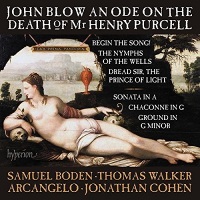Texte paru dans: / Appeared in:
Hyperion |
|
|
Outil de traduction ~ (Très approximatif) |
|
|
Reviewer: Jim
Svejda Were it not for his most gifted pupil, Henry Purcell, John Blow (1649–1708) might be remembered today as the most important English composer of the Restoration. In addition to Venus and Adonis, the earliest thorough-composed English opera (upon which Purcell modeled Dido and Aeneas), Blow produced an enormous amount of sacred and secular music in virtually all the available forms, most of it of an extraordinarily high quality. He was also a kindly and generous man. When Purcell’s marriage threatened to take him out of London, Blow gave up his post as organist at Westminster Abbey to keep his pupil in town; while serving as the organist and choirmaster at the newly-consecrated St. Paul’s Cathedral, he made a similar sacrifice in favor of another student, the ill-starred Jeremiah Clarke. This intelligently planned collection begins with Begin the Song!, Blow’s St. Cecilia ode from 1684. While the words by John Oldham might not be a match for those in the St. Cecilia odes of John Dryden—who so admired Oldham that he composed an elegy when the poet died of smallpox at the age of 30—Blow responds with a lively and imaginative setting, including an aria written for the celebrated ink-black bass John Gostling that plummets to a low D, which the game Callum Thorpe negotiates with some difficulty. The final chorus, “Come then, with tuneful breath and string” clearly looks forward to the rousing odes that Handel would write a half century later. While understandably more somber, An Ode on the Death of Mr. Henry Purcell is by no means funereal, as the Dryden poem is more celebratory than mournful: Though gone, it reassures us, he now teaches the heavenly choir how to sing. Cast for pairs of tenors and recorders—which Bach would use to equally memorable effect in the Actus Tragicus—plus the usual continuo, the music is both superbly crafted and deeply moving, as befits a man saying farewell to a close and valued friend. Further, its intimacy and directness belies a dazzling contrapuntal command fully impressive as Purcell’s own. The Nymphs of the Wells is a 1697 ode for the eighth birthday of William, Duke of Gloucester, son of Princess Anne and Prince George of Denmark. Although the anonymous text is one of the most laughable examples of typically ridiculous Royal hyperbole—the sickly Duke, who would die at the age of 11, is called “the royal Oak which this day bears / The full account of twice four years”—Blow’s setting of this outrageous puffery is both deftly tuneful and charmingly whimsical, thus perfectly suited for a boy of eight. Although Dread Sir, the Prince of Light is another of those ceremonial odes designed to be topical and fleeting—this one written for the New Year’s celebrations of 1678—its quality has made it last as long as the fond memories of Charles II, the witty monarch who when asked why he refused to express publicly his belief in the divine right of kings, said simply: “Because I do not wish to go again on my travels.” While generally brisk and carefree, the concluding bass aria “This happy omen” gives the work an unexpected gravitas not usually associated with such transitory entertainments. One wonders if His Majesty—given his frequently quoted pronouncements on the subject—might have been slightly embarrassed by the consummately divine right-ish “The stars are subject to your princely soul.”
It’s hard
to imagine more lively or devoted performances than the ones given by
Jonathan Cohen’s Arcangelo, either of the odes themselves or the shrewdly
chosen instrumental works that almost serve as entr’actes to the main
events. The vocal soloists are also uniformly superb, making this an ideal
reminder of a still under-appreciated composer.
| |
|
Support us financially by purchasing this disc from eiher one of these suppliers. Un achat via l'un ou l'autre des fournisseurs proposés contribue à défrayer les coûts d'exploitation de ce site. |
|
|
|
|
|
Cliquez l'un ou l'autre
bouton pour découvrir bien d'autres critiques de CD |
|




